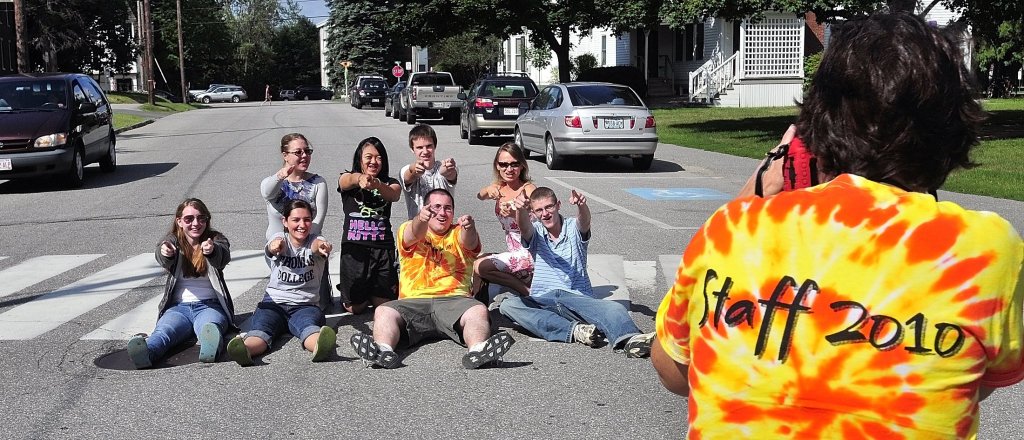
FARMINGTON — The U.S. Department of Education has cut over $600,000 in promised funding, claiming the program includes diversity and social justice programming and thus runs counter to Trump administration policies.
The program, River Valley Upward Bound, operates out of the University of Maine at Farmington and supports low-income and first-generation high school students in Oxford and Androscoggin counties.
The federal agency informed UMF and the University of Maine System on Sept. 12 that the Upward Bound program’s $309,505 annual grant for five years would not be continued. The funding was awarded in 2022 and was expected to run for two more years. Additionally, an award to the University of Southern Maine’s Veterans Upward Bound program, the only program of its kind in the state, received a non-continuation notice the same day.
The University of Maine System has appealed both non-continuances. A spokesperson disputed the education department’s claims, saying the program aligns with recent federal guidance.
The move ends River Valley Upward Bound, which started in 2012 and was one of 2,800 “TRIO” programs nationally that provide support and mentoring to first-generation, low-income and disabled students hoping to go to college. TRIO consists of Upward Bound, Talent Search, Student Support Services, Veterans Upward Bound, Educational Opportunity Centers, Ronald E. McNair Postbaccalaureate Achievement, Upward Bound Math-Science and Training Program for Federal TRIO Programs Staff.
According to the funding termination notice from the Department of Education, continuation of the grant requires that the project is in “the best interest of the Federal Government.”
The notice goes on to assert that UMF’s original application included diversity and social justice programming, recognition of gender expression, staff training with LGBTQIA+ advocacy groups and student participation in statewide LGBTQ youth conferences.
Those activities, DOE said, aligned with Biden administration policies and “conflict(s) with those of the current Administration.”
Samantha Warren, spokesperson for the University of Maine System, disputed the claims.
“Consistent with more recent Executive Orders and federal guidance, these activities, which were aligned with the 2021 call for proposals, are no longer part of the program’s strategies,” Warren said.
The loss of the River Valley program will affect around 60 students a year, according to officials. UMF reported that last year’s cohort had a 100% high school graduation rate, compared with a statewide average of 88%.
The River Valley program serves six schools: Mountain Valley in Rumford, Telstar in Bethel, Dirigo in Dixfield, Edward Little in Auburn, Oxford Hills Comprehensive in South Paris and Buckfield Junior/Senior high schools.
Warren said the program serves communities with lower-than-average household incomes, graduation rates and reading and math proficiency.
It offers year-round academic advising, support with college and financial aid applications, career exploration, summer residential programs at UMF and a bridge week to prepare them for college.
As part of the program, students logged nearly 1,000 hours of community service in local organizations ranging from elder care to early childhood education.
Levi Cavener, a Buckfield Junior/Senior High School teacher, has advised Upward Bound for the past three years. He said when the funding is pulled indefinitely come Sept. 30, it will have an immediate impact on students.
“Students found out about the change yesterday along with the staff. They were extremely upset. They wanted to know why the funds were being withheld, and we were not given any reason at this point for the money not being renewed,” Cavener said.
Without the program, Cavener said, many qualified students will miss out on opportunities from completing applications to exploring campuses.
The range of support the grant provides includes a five-week summer program on a college campus, classes, learning study habits, team-building activities and networking with instructors, Cavener said.
An academic advisor meets with students during the school year to monitor grades, provide academic planning, assist with scholarship applications and help seniors register for college. The grant also funds trips to colleges, which gives students exposure to post-secondary academia and life.
“This program is designed to bridge the gap for students from low-income families or families where parents did not attend college,” Cavener said. He said at least one of his students will now not be able to afford college application fees.
The University of Maine System has 22 TRIO awards across six universities, Warren said, noting that all of Maine’s other TRIO grant awards, including UMF’s Foothills Upward Bound program, remain unaffected by the Department of Education’s decision.
In a letter to students, families and schools, UMF staff said they were “shocked and saddened” by the decision. They also warned that, as a result, services will cease if the funding is not restored.

Mountain Valley High School alumna Darcy Chase, who joined Upward Bound in the early 1990s, said the program was life-changing. She said her parents wanted her to be able to attend college but had no experience with the process, and Upward Bound provided the resources she needed to succeed.
“Having these other adults really made a difference as far as feeling prepared and supported,” Chase said.
Chase attended UMF for a year before transferring to the University of Southern Maine for her bachelor’s and master’s degrees. Last summer, she returned to UMF to teach in the Upward Bound program.
Chase said the DOE decision was devastating to hear.
“There’s no good reason to take this away from these kids,” she said. “It’s doing an amazing, wonderful service … helping them to get an education and to better their future.”
The cancellations are highly unusual, according to Kimberly Jones, president of the Council for Opportunity in Education. TRIO grants are typically only ended if grantees fail to meet benchmarks or student participation requirements, she said.
“There has never been the mass cancellation of grants like we have seen in recent months,” Jones said. “The cancellations have all been related to alleged violations of the administration’s interpretations of federal civil rights law and have included offenses like offering diversity training for program staff or partnering with diversity offices on college campuses.”
UMF has filed an appeal through the University of Maine System, and Maine’s congressional delegation has been contacted in hopes of reversing the decision.
U.S. Sen. Susan Collins, who co-chairs the Congressional TRIO Caucus, is a strong supporter of the TRIO grants. Her office confirmed Tuesday she has reached out to the Department of Education regarding two canceled TRIO awards.
In a statement issued Tuesday in response to the UMF grant cancellation, she said, “I support Upward Bound funding and the opportunities it provides for many low-income and first-generation students seeking higher education.”
U.S. Rep. Jared Golden’s office confirmed it is working with UMF and the university system “to get to the bottom of this funding decision, identify the impacts, and find a path forward for TRIO programs in Maine.”
“The recent cancellations of Federal TRIO Programs in Maine are devastating,” Rep. Chellie Pingree said in a statement to the Sun Journal. “These initiatives have been transformational for so many individuals and families. … They’re proven, they’re popular, and they make our state —and our country — stronger.”
Pingree criticized the Trump administration for targeting programs that empower underserved communities and pledged to fight to preserve and protect these initiatives.
A July 7 press release issued by Collin’s office stated that 11 Maine colleges and universities secured nearly $5 million in TRIO Student Support Services grants for the 2025-26 academic year.
Schools set to receive these TRIO funds are: University of Maine, $694,807; Central Maine Community College, $620,879; University of Maine at Augusta, $566,531; University of Southern Maine, $544,728; Southern Maine Community College, $544,728; University of Maine at Presque Isle, $373,084; University of Maine at Fort Kent, $356,773; Kennebec Valley Community College, $352,531; University of Maine at Farmington, $352,530; Washington County Community College, $302,912; and Eastern Maine Community College, $272,364.
In that July press release, Collins stated, “I have seen the lives of countless first-generation and low-income students, not only in Maine, but across the country, changed by the TRIO program. I am glad the Secretary of Education followed through on the commitment she made to me at our Appropriations hearing to disburse these grants, and I will continue to urge the Administration to support this critical investment into our students and schools.”

We invite you to add your comments. We encourage a thoughtful exchange of ideas and information on this website. By joining the conversation, you are agreeing to our commenting policy and terms of use. More information is found on our FAQs. You can modify your screen name here.
Comments are managed by our staff during regular business hours Monday through Friday as well as limited hours on Saturday and Sunday. Comments held for moderation outside of those hours may take longer to approve.
Join the Conversation
Please sign into your CentralMaine.com account to participate in conversations below. If you do not have an account, you can register or subscribe. Questions? Please see our FAQs.